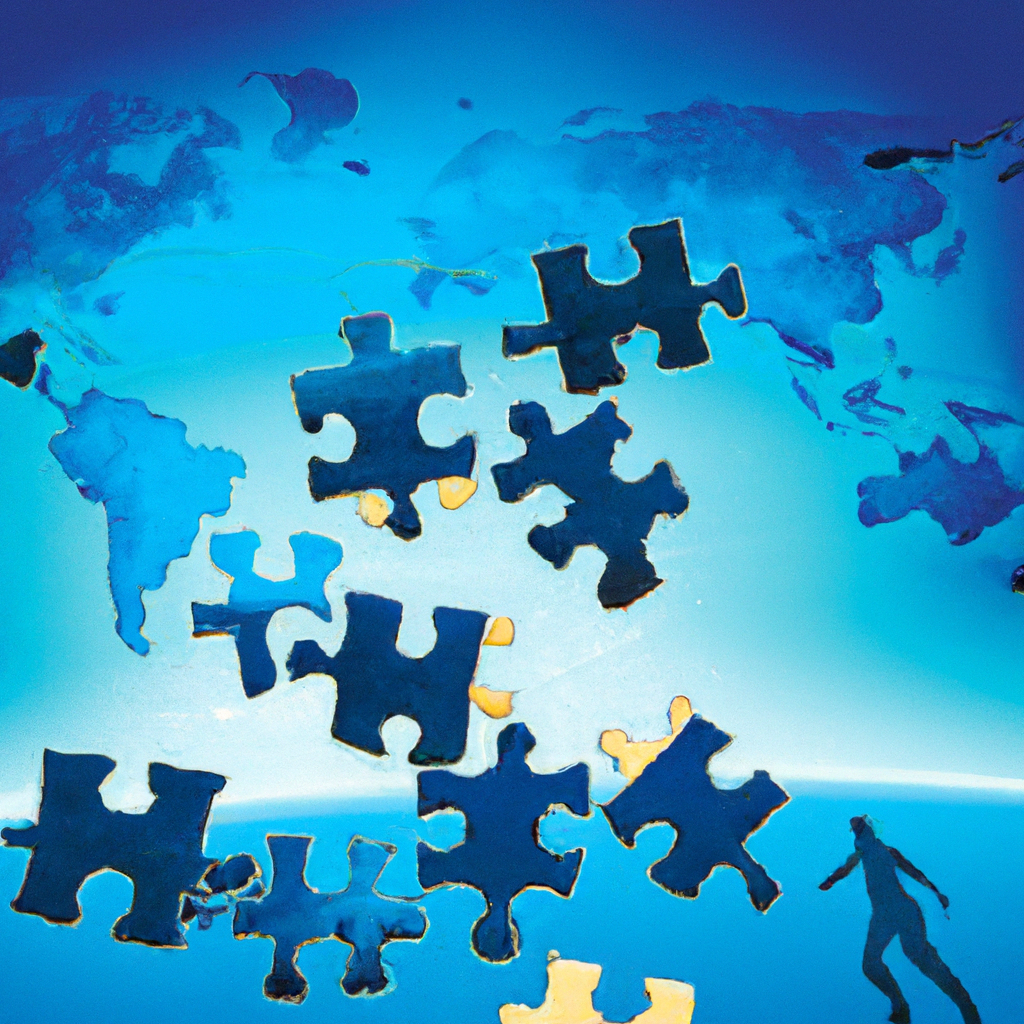In today’s rapidly advancing world, the potential of artificial intelligence (AI) to solve global problems is a topic that sparks curiosity and debate. As technology continues to evolve, the question of whether AI can be harnessed to address the most pressing issues of our time becomes increasingly relevant. From poverty and hunger to climate change and healthcare, the possibilities seem endless. Join us on an exploration as we delve into the potential applications of AI in tackling these world problems and discover how it can revolutionize the way we approach global challenges.

Understanding AI
Artificial Intelligence (AI) refers to the simulation of human intelligence in machines that are programmed to think and learn like humans. It is a branch of computer science that aims to create intelligent machines capable of performing tasks that typically require human intelligence. AI encompasses various technologies such as machine learning, natural language processing, computer vision, and robotics.
Definition of AI
AI can be defined as the field of study and development of computer systems that can perform tasks that would typically require human intelligence. These tasks include speech recognition, problem-solving, decision-making, visual perception, and language translation. AI systems are designed to learn from data, adapt to new situations, and improve their performance over time.
AI Capabilities
AI systems have several capabilities that make them powerful tools for solving complex problems. These capabilities include:
-
Machine Learning: AI systems can analyze large amounts of data and identify patterns and trends. They can learn from this data and make predictions or decisions based on their findings.
-
Natural Language Processing: AI systems can understand and interpret human language. They can process text or speech, extract meaning from it, and generate appropriate responses.
-
Computer Vision: AI systems can analyze and interpret visual information. They can recognize and identify objects, faces, and gestures in images or videos.
-
Expertise in Narrow Domains: AI systems can be trained to become experts in specific fields or domains. They can acquire knowledge and perform tasks that require specialized knowledge and expertise.
-
Automation: AI systems can perform tasks automatically without human intervention. They can automate repetitive or mundane tasks, allowing humans to focus on more complex and creative endeavors.
AI Applications
AI has a wide range of applications across various industries and sectors. Some prominent applications of AI include:
-
Healthcare: AI can be used to analyze medical data, identify patterns, and make faster and more accurate diagnoses. It can also assist in surgical procedures, monitor patient vital signs, and develop personalized treatment plans.
-
Finance: AI can be used for fraud detection, risk assessment, and algorithmic trading in financial institutions. It can analyze financial data, predict market trends, and optimize investment strategies.
-
Transportation: AI can improve the safety and efficiency of transportation systems. It can enable self-driving cars, optimize traffic flow, and improve logistics and supply chain management.
-
Education: AI can enhance personalized learning experiences for students. It can provide personalized recommendations, adaptive assessments, and virtual tutoring.
-
Customer Service: AI-powered chatbots can provide efficient customer support, answer queries, and resolve issues. They can understand natural language, provide accurate responses, and handle multiple customer interactions simultaneously.

AI Limitations
Despite its numerous capabilities, AI also has certain limitations that need to be considered. Some of these limitations include:
-
Lack of Common Sense: AI systems lack common sense reasoning and may struggle to understand context or navigate ambiguous situations.
-
Data Dependency: AI systems rely heavily on data for learning and decision-making. Lack of quality data or biased data can impact the accuracy and fairness of AI systems.
-
Ethical Dilemmas: AI systems can raise ethical concerns, such as privacy infringement, algorithmic bias, and potential job displacement.
-
Human-Machine Interaction: AI systems may struggle to effectively communicate and interact with humans in natural language or understand emotions and intentions.
-
Security Risks: AI systems can be vulnerable to cyber-attacks and misuse of AI technology for harmful purposes.
World Problems and Challenges
In order to address the world’s problems effectively, it is essential to first define and understand these problems. World problems can be broadly categorized as social, economic, environmental, and geopolitical challenges. These problems include poverty, inequality, disease outbreaks, climate change, natural disasters, conflicts, and political instability.
Major global challenges that require urgent attention and solutions include:
-
Sustainable Development: Achieving sustainable development is crucial for addressing poverty, inequality, and environmental degradation. This involves balancing economic growth with social development and environmental preservation.
-
Poverty Eradication: Poverty remains a pressing issue globally, with millions of people living in extreme poverty. It is essential to implement strategies that promote inclusive economic growth, access to basic necessities, and social protection for vulnerable populations.
-
Healthcare Improvement: Providing quality healthcare for all is vital for improving global health outcomes. Opportunities for leveraging AI in healthcare include disease diagnosis, drug discovery, telemedicine, and health monitoring.
-
Climate Change Mitigation: Climate change poses a significant threat to the planet and human well-being. Addressing climate change requires reducing greenhouse gas emissions, developing clean energy sources, and adopting sustainable practices in industries.
-
Education Enhancement: Quality education is essential for individual empowerment and economic development. AI can contribute to enhancing access to education, personalized learning, and skills development.

Role of Technology in Addressing World Problems
Technology, including AI, can play a crucial role in addressing the world’s problems and challenges. It can provide innovative solutions, increase efficiency, and enable informed decision-making. Some ways technology can address world problems include:
-
Data-driven Decision-making: Technology can provide access to real-time data and analytics, enabling policymakers to make informed decisions and implement evidence-based interventions.
-
Efficiency and Automation: Technology can automate processes, reduce administrative burdens, and improve the efficiency of various sectors, such as healthcare, agriculture, and transportation.
-
Improved Access and Connectivity: Technology can bridge the digital divide by enhancing connectivity and providing access to information and services in remote and underserved areas.
-
Innovation and Research: Technology can facilitate research and development, enabling the creation of new solutions to complex challenges. AI can accelerate scientific discovery, drug development, and engineering breakthroughs.
-
Empowerment and Collaboration: Technology can empower individuals and communities by providing tools for communication, education, and economic opportunities. It can also facilitate collaboration between governments, organizations, and individuals in addressing global challenges.
AI’s Potential in Solving World Problems
AI has immense potential to contribute to solving world problems and achieving global development goals. Some advantages of using AI in addressing world problems include:
-
Improved Efficiency: AI can automate processes, analyze large datasets, and provide real-time insights, leading to improved efficiency in various sectors.
-
Enhanced Decision-making: AI can provide data-driven insights and predictive analytics, enabling policymakers to make informed decisions and allocate resources efficiently.
-
Personalization and Customization: AI can provide personalized solutions and services tailored to individual needs, enhancing their effectiveness and impact.
-
Risk Assessment and Early Warning: AI can analyze data and identify patterns to predict and mitigate risks, such as disease outbreaks, natural disasters, or financial crises.
-
Increased Access to Services: AI can bridge the gap in service delivery by providing remote and automated services, especially in areas with limited resources or infrastructure.
AI can be leveraged in specific areas to address world problems:
-
AI for Sustainable Development: AI can contribute to sustainable development by optimizing resource allocation, promoting renewable energy, and designing smart cities.
-
AI for Poverty Eradication: AI can help design targeted interventions, assess social impact, and create inclusive economic opportunities.
-
AI for Healthcare Improvement: AI can enhance healthcare delivery by improving diagnostic accuracy, facilitating remote consultations, and enabling personalized treatments.
-
AI for Climate Change Mitigation: AI can support efforts in monitoring environmental changes, optimizing energy consumption, and developing climate resilience strategies.
-
AI for Education Enhancement: AI can personalize learning experiences, adapt teaching methods, and provide access to quality education for marginalized populations.

Ethical Considerations in AI Usage
As AI becomes more prevalent, it is essential to address ethical considerations associated with its usage. Some of the key ethical concerns are:
-
Bias and Fairness: AI systems can reflect the biases present in the data they are trained on, leading to unfair outcomes or discrimination. It is crucial to ensure fairness and transparency in the development and deployment of AI systems.
-
Privacy Concerns: AI systems often require access to personal data for training or decision-making. Protecting privacy rights and ensuring data security is crucial to build public trust in AI systems.
-
Potential Job Displacement: Automation driven by AI can lead to job displacement in certain industries. It is necessary to anticipate and provide support for affected workers by reskilling, upskilling, or creating new employment opportunities.
-
Responsible Development and Deployment of AI: Developers, policymakers, and organizations need to ensure that AI systems are designed and used responsibly, considering ethical guidelines, legal frameworks, and societal impact.
Addressing these ethical considerations proactively will help mitigate potential risks and ensure AI technology is used in a manner that aligns with societal values and interests.
AI-assisted Decision Making
AI can serve as a valuable tool in decision-making processes across various domains. Its ability to analyze vast amounts of data, identify patterns, and make predictions can support policymakers in formulating effective strategies and policies. Some applications of AI-assisted decision making include:
-
Enhanced Data Analysis: AI can analyze large datasets and extract valuable insights that can inform decision-making processes. It can identify trends, predict outcomes, or detect anomalies.
-
Policy Formulation: AI systems can analyze complex policy issues, evaluate potential outcomes, and simulate scenarios. This can assist policymakers in understanding the impact of different policy options and selecting the most suitable course of action.
-
Optimizing Resource Allocation: AI can optimize resource allocation by considering multiple factors, such as cost, efficiency, and impact. It can help governments and organizations allocate budgets, prioritize projects, or distribute resources more effectively.
-
Risk Assessment and Management: AI can assess risks by analyzing historical data and identifying patterns or correlations. It can provide early warnings, estimate probabilities of events, and recommend risk mitigation strategies.
While AI can facilitate decision making, it is important to strike a balance between human judgment and AI recommendations. Human oversight and critical thinking are essential to ensure that decisions align with ethical, legal, and contextual considerations.

AI’s Impact on Governance
AI has the potential to transform the governance landscape by improving decision-making processes, enhancing service delivery, and increasing citizen participation. Some ways AI can impact governance are:
-
Efficient Service Delivery: AI can automate administrative processes, streamline service delivery, and reduce bureaucracy. This can improve the efficiency and effectiveness of public services, such as healthcare, transportation, or public utilities.
-
Data-Driven Policymaking: AI can provide policymakers with reliable and timely data, enabling evidence-based decision making. It can analyze complex issues, identify patterns, and generate insights that inform policy formulation and implementation.
-
Enhanced Public Engagement: AI can facilitate citizen participation by providing platforms for feedback, consultation, and deliberation. It can empower citizens to contribute to decision-making processes and enhance transparency and accountability.
-
Improved Public Safety and Security: AI can assist in enhancing public safety and security by analyzing data from various sources, such as surveillance cameras, social media, or sensor networks. It can help detect threats, prevent crime, and respond to emergencies more effectively.
AI’s impact on governance will depend on the responsible and inclusive deployment of AI systems, while also addressing concerns related to privacy, bias, accountability, and transparency.
Collaborative Approach in AI Implementation
The successful implementation of AI solutions requires collaborative efforts involving governments, private sector entities, academia, and civil society organizations. Collaboration can ensure the sharing of knowledge, resources, and best practices, leading to more effective and sustainable solutions. Some key aspects of a collaborative approach in AI implementation include:
-
Public-Private Partnerships: Collaboration between the public and private sectors can leverage the strengths of both entities. Governments can provide regulatory frameworks, funding, and access to data, while private sector entities can contribute technical expertise, innovation, and resources.
-
International Cooperation: Addressing global challenges often requires international collaboration. Countries can share knowledge, experiences, and resources to jointly tackle common problems, such as climate change, public health crises, or poverty.
-
Sharing Knowledge and Resources: Collaboration among academia, research institutions, and organizations can facilitate the sharing of knowledge, data, and expertise. It can accelerate research, innovation, and the development of AI solutions.
-
Capacity Building and Skills Development: Collaboration can focus on building the necessary capacity and skills to effectively implement AI solutions. This can include training programs, workshops, and knowledge sharing initiatives.
By adopting a collaborative approach, stakeholders can pool their resources, expertise, and efforts to address world problems effectively and create sustainable solutions.
Investment and Adoption of AI for Global Good
Significant investments and widespread adoption of AI for global good are essential for achieving sustainable development goals and addressing world problems. The following are critical aspects of promoting investment and adoption of AI for global good:
-
Financial Resources for AI Development: Governments, international organizations, and private sector entities should invest in research, development, and deployment of AI solutions. Funding should be directed towards areas such as healthcare, education, environment, and poverty eradication.
-
Education and Skill-building Efforts: Investing in education and skill-building initiatives is crucial to develop the necessary expertise in AI. This includes training programs, curriculum development, and scholarships to facilitate the growth of AI professionals.
-
Promoting AI Adoption in Developing Countries: Efforts should be made to ensure that AI benefits reach all countries, including developing ones. Capacity building, technology transfer, and partnership programs can support developing countries in adopting and utilizing AI solutions effectively.
-
Regulatory Frameworks and Standards: Governments and international organizations need to develop regulatory frameworks and standards for AI to ensure ethical, safe, and responsible development and deployment. These frameworks should address concerns such as bias, data privacy, transparency, and accountability.
By investing in AI development, promoting education and skills, enabling technology transfer, and establishing regulatory frameworks, the global community can harness the full potential of AI for the betterment of humanity.
Overcoming Obstacles and Risks
While AI holds great promise, there are obstacles and risks that need to be overcome to ensure its responsible and effective use. Some key areas of focus to address these challenges include:
-
Addressing Technological Gaps: Bridging the technological divide is crucial to ensure that all countries and populations can benefit from AI solutions. Efforts should be made to provide access to infrastructure, connectivity, and training opportunities in underserved areas.
-
Ensuring AI Safety and Security: AI systems need to be designed with safety and security in mind. Robust testing, validation, and verification procedures should be in place to minimize the risk of AI system failures or malicious use.
-
Regulatory Frameworks for AI: Governments and international organizations should develop regulatory frameworks that balance innovation and safety. These frameworks should address concerns such as privacy, bias, accountability, and the responsible use of AI technology.
-
Public Perception and Acceptance: Building public trust and acceptance of AI is essential for its widespread adoption. Transparency, explainability, and public engagement are crucial in shaping positive perceptions and allaying concerns about AI technology.
By addressing these obstacles and risks proactively, society can reap the benefits of AI while minimizing potential harm.
AI’s Role in Humanitarian Aid and Disaster Response
AI can play a critical role in humanitarian aid and disaster response efforts, providing timely and effective support to affected populations. Some specific applications of AI in this context include:
-
AI for Early Warning Systems: AI can analyze data from various sources, such as weather forecasts, seismic sensors, or social media, to predict and provide early warnings for natural disasters, disease outbreaks, or conflicts.
-
Using AI in Disaster Management: AI can assist in disaster management by analyzing satellite imagery, drones, or sensor networks to assess the extent of damage, prioritize response efforts, and allocate resources effectively.
-
Humanitarian AI Initiatives: Several organizations and initiatives are leveraging AI to address humanitarian challenges. These include using AI for refugee identification, optimizing humanitarian logistics, or facilitating crisis communication.
AI can provide valuable support in preparing for and responding to humanitarian crises, speed up response times, and save lives.
Conclusion
AI has the potential to revolutionize the way we address world problems and tackle major global challenges. Its ability to analyze vast amounts of data, generate insights, and make predictions can support evidence-based decision making, improve efficiency, and enable innovative solutions. However, it is essential to address ethical considerations, ensure responsible use, and promote collaboration and inclusivity in AI implementation. By harnessing the power of AI effectively and responsibly, we can pave the way for a better and more sustainable future with global good at its core.










